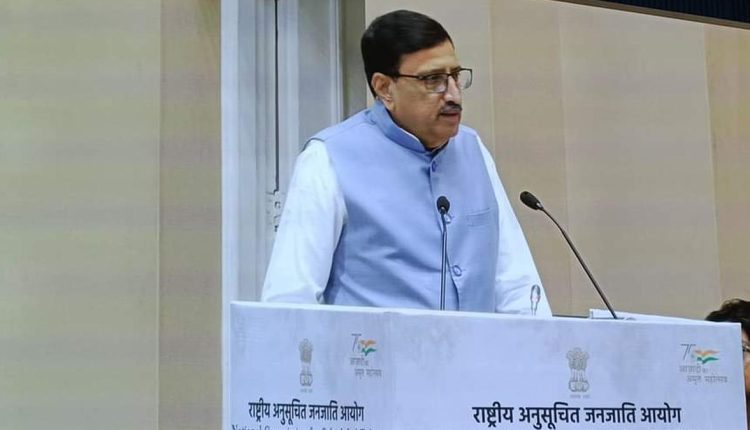NCST Chairperson Harsh Chouhan. File image: Twitter/@ncsthq
The National Commission for Scheduled Tribes is following up with 104 universities and research institutes, asking the administrations as to what steps they have taken to promote studies and work on tribal rights, tribal identity, and tribal development in their respective institutes.
The universities include a couple of IITs, IIMs, and NITs, in addition to ones such as the Banaras Hindu University, Delhi University (DU), Assam University, University of Mumbai, Birsa Munda Tribal University in Gujarat, Central University of Odisha and several others.
The move comes on the back of a year-long campaign by the ST Commission, which has held events across 125 universities in India with a key focus on tribal freedom fighters, keeping in line with the Union government’s “Azadi Ka Amrit Mahotsav” campaign.
The series of events culminated in a two-day workshop held in Delhi in November 2022, attended by 70 Vice-Chancellors, TRI (Tribal Research Institute) Directors and hundreds of anthropologists, sociologists and other researchers. President Droupadi Murmu made the closing remarks announcing that such discussions on tribal research should serve as a starting point.
Soon after, Delhi University became the first to act upon the discussions held at the workshop by announcing on January 12 the formation of a Committee to examine the possibility of setting up a Centre for Tribal Studies.
Dr. Looke Kumari of DU’s Bharti College, part of the 11-member Committee, said: “The Centre for Tribal Studies will soon be opened under DU’s Ordinance 20 and the V-C has agreed to annual funding of ₹50 lakh every year to it as well. We are working on setting the course framework and it will have a focus on research related to indigenous knowledge.”
Now, the NCST has written to all 104 universities and institutes where smaller events were held over 2021 and 2022 and to those who had attended the workshop in November 2022, officials said.
They said the Commission has asked the administrations about the steps taken to introduce courses on tribal research and also asked them to provide a timeline for the plans in this direction, if they had any.
This is in keeping with a concerted effort from the NCST to push for more documentation of tribal and indigenous cultures and societies in India by members of those communities themselves. The logic is that the existing literature on the subject is heavily reliant on what was created by colonial governments.
NCST Chairperson Harsh Chouhan had said at the closing of the workshop in last November that the Commission intends to submit a report to the government on the takeaways from the workshop so that it too can direct its efforts to create a comprehensive body of tribal research in India.


